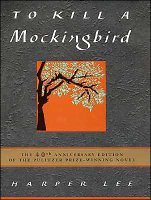
To Kill a Mockingbird is a masterful and classic tale of growing up in the South. Scout Finch narrates the story of her formative years growing up in the small town of Maycomb, Alabama. Scout and her brother discover the way the world functions, and learn some important lessons in life. The two of them, with their friend Dill, spend their summers dreaming about Boo Radley, the recluse who lives a few houses down. Having never seen him, they spend endless hours speculating about his identity, and the reason he stays indoors. This childhood fascination serves as the backdrop for an important episode in the coming of age of Scout and her brother Jem, the trial of Tom Robinson for rape. Tom, a black man, has been accused of rape by Mayella Ewell and her father Bob Ewell. The accusation come to trial, and Scout's dad, Atticus, is appointed to defend Tom. During the trial, he raises some important questions about the claims by the Ewells, and draws out a very clear suspicion that what in fact happened is that Mayella had drawn Tom into the house, and made an advance at him, and that her father Bob Ewell had seen the two of them together, and been furious with his daughter, beating her. They then blamed the whole encounter on Tom. After many hours deliberating, the jury came back with a guilty verdict. This crushed Jem and Scout, who had come to believe in Tom's innocence, and couldn't understand how anyone couldn't see it. This demonstrated what had become a steady development in the kids' own conscience and moral compass. Through coming to walk a mile in Tom's shoes, they had learned to take a careful look at the world, and to look equally on all people, or at least were making strong strides in that direction. The story culminates in an attack by Bob Ewell on Scout and Jem as they walked home after a school event. Bob attempted to kill the kids, and injured Jem quite badly in the process. But they were saved by a shadowy figure who appeared, Boo Radley.
Lee has written a great story about a quaint Southern town, and its struggles with racism and prejudice. It is a spectacular character study, and a clear commentary on the times, as well as a good reminder for any time that our consciences must be formed and shaped, and that theymust be carefully guided, because consciences can run astray. To Kill a Mockingbird is definitly worth reading, or reading again.
No comments:
Post a Comment